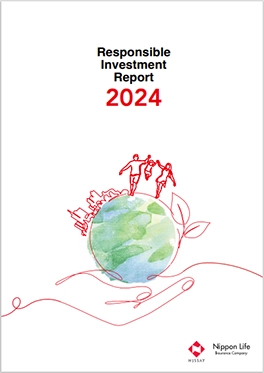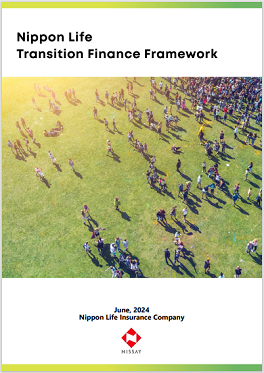Since its founding, Nippon Life has based its life insurance operations on the spirit of "co-existence, co-prosperity, and mutualism." With this in mind, Nippon Life has made efforts to conduct sound management from a long-term perspective, while giving the highest priority to maximizing benefits for our customers. In the asset management field, Nippon Life has carried out investment and finance that contributes to the public good.
Nippon Life believes that responsible investment, which considers Environmental (E), Social (S) and Governance (G) issues, is an approach that seeks to support activities to achieve the SDGs* from investment and finance perspectives. Concurrently, the Company believes that responsible investment essentially shares the same foundation as the asset management approach it has long emphasized―one that considers profitability, security and the public good. Accordingly, Nippon Life is convinced that responsible investment is an approach that will raise the sophistication of its traditional investment and finance decisions from medium- and long-term perspectives.
In the past few years, Nippon Life has been further strengthening its responsible investment activities since it signed the United Nations Principles for Responsible Investment (PRI)* in 2017.
Responsible investment can also contribute to investment returns because, by considering environmental and social factors in investment and finance decisions, the sustainability of the global environment and society, which is the foundation of all companies' business activities, can be improved.
In addition, the companies in which we invest aim to solve environmental and social issues and seize revenue opportunities that capture social demand, thereby increasing their corporate value.
In this way, responsible investment contributes both to realizing a sustainable society and to increasing the corporate value of investee companies, and the resulting improvement in investment returns leads to greater customer benefits, such as the reliable payment of insurance claims and benefits along with the stable payment of policyholder dividends.
-
*
PRI are a set of principles aiming to realize a sustainable society by proposing that institutional investors incorporate ESG issues in their investment decisions.
Nippon Life views climate change as an important risk for asset management and has supported activities aimed at promoting decarbonization at investee and borrower companies through funding and dialogue. Against this backdrop, to further strengthen measures to address climate change, Nippon Life has endorsed the Japanese government's policy to target net zero emissions of Greenhouse Gasses (GHG) by 2050 and has set 2030 interim targets for GHG emission reduction in the investment portfolio* in order to achieve a net zero target by 2050.
-
*
Target assets are domestic and foreign listed equities, domestic and foreign corporate bonds, and real estate.
2030 Interim Targets for GHG Emission Reduction in the Investment Portfolio
| Total Emissions |
Reduce by more than or equal to 45% (compared to 2010) |
|---|---|
| Intensity* |
Reduce by more than or equal to 49% (compared to 2020) |
-
*
Emissions per investment unit, total emissions/investment amount







